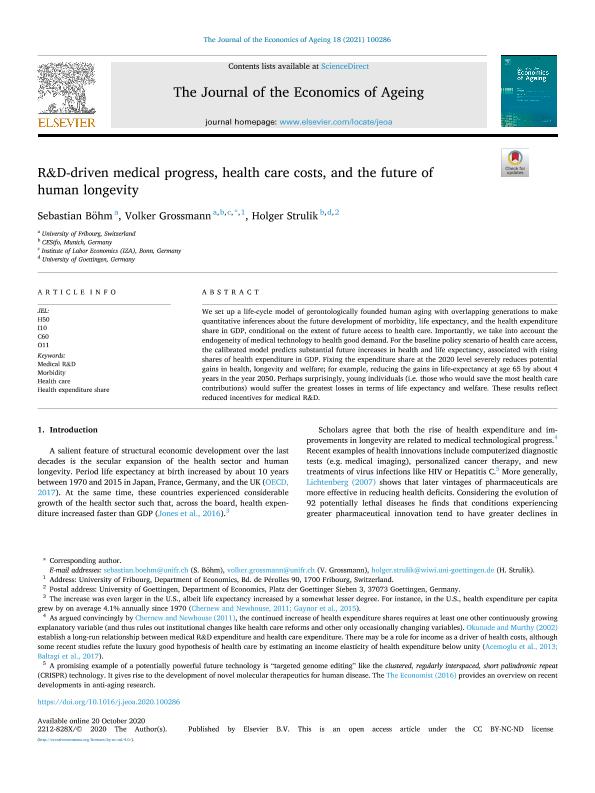R&D-driven medical progress, health care costs, and the future of human longevity

Contenido multimedia no disponible por derechos de autor o por acceso restringido. Contacte con la institución para más información.
| Tag | 1 | 2 | Valor |
|---|---|---|---|
| LDR | 00000cab a2200000 4500 | ||
| 001 | MAP20210010316 | ||
| 003 | MAP | ||
| 005 | 20210405202057.0 | ||
| 008 | 210329e20210201esp|||p |0|||b|spa d | ||
| 040 | $aMAP$bspa$dMAP | ||
| 084 | $a931 | ||
| 100 | 1 | $0MAPA20210005220$aBöhm, Sebastian | |
| 245 | 1 | 0 | $aR&D-driven medical progress, health care costs, and the future of human longevity$cSebastian Böhm, Volker Grossmann, Holger Strulik |
| 520 | $aWe set up a life-cycle model of gerontologically founded human aging with overlapping generations to make quantitative inferences about the future development of morbidity, life expectancy, and the health expenditure share in GDP, conditional on the extent of future access to health care. Importantly, we take into account the endogeneity of medical technology to health good demand. For the baseline policy scenario of health care access, the calibrated model predicts substantial future increases in health and life expectancy, associated with rising shares of health expenditure in GDP. Fixing the expenditure share at the 2020 level severely reduces potential gains in health, longevity and welfare; for example, reducing the gains in life-xpectancy at age 65 by about 4 years in the year 2050. Perhaps surprisingly, young individuals (i.e. those who would save the most health care contributions) would suffer the greatest losses in terms of life expectancy and welfare. These results reflect reduced incentives for medical R&D. | ||
| 650 | 4 | $0MAPA20080567262$aSalud pública | |
| 650 | 4 | $0MAPA20080555016$aLongevidad | |
| 650 | 4 | $0MAPA20080579784$aCostes económicos | |
| 650 | 4 | $0MAPA20080612092$aProducto interior bruto | |
| 700 | 1 | $0MAPA20210005237$aGrossmann, Volker | |
| 700 | 1 | $0MAPA20210005244$aStrulik, Holger | |
| 773 | 0 | $wMAP20210010194$tThe Journal of the economics of ageing $dOxford : Elsevier ScienceDirect, 2021-$g01/02/2021 Volumen 18 - 2021 , 18 p. |

